|
|
|
Sort Order |
|
|
|
Items / Page
|
|
|
|
|
|
|
| Srl | Item |
| 1 |
ID:
174904
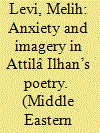

|
|
|
|
|
| Summary/Abstract |
The article offers a detailed study of the twentieth-century Turkish poet Attilâ İlhan’s early work by focusing on the use of imagery and atmosphere. The critical term in Turkish literary studies for imagery is imge and the term has acquired an unsettlingly wide semantic range since its popularization with the rise of the İkinci Yeni poetry movement in the 1950s and 60 s. İkinci Yeni's descriptive procedures continue to be the dominant influence on Turkish poetry today and this article turns the spotlight on Attilâ İlhan in order to trace alternative conceptions of imagery which were developed concurrently and in reaction to the İkinci Yeni movement. The article engages with relevant psychoanalytic and affect theories that help elucidate İlhan's use of anxiety as a socially and poetically constitutive force.
|
|
|
|
|
|
|
|
|
|
|
|
|
|
|
|
| 2 |
ID:
174899
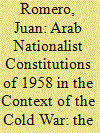

|
|
|
|
|
| Summary/Abstract |
Unlike many works on constitutions, this article focuses on non-legal aspects of the framing of Arab constitutions. This emphasis on the social and political in lieu of purely legal aspects of constitution-making allows us to place constitutions in a wider regional and not merely national context, and interpret them from a not strictly legal perspective. By adopting such an approach, historians can explain the extent to which the turbulence in the Arab world in the 1950s as a result of Arab nationalism, the creation of the state of Israel, the rivalry between revolutionary and monarchic Arab regimes, and the Cold War affected three Arab organic laws in the revolutionary year of 1958. This focus on contemporary social and political developments enables scholars to explain why the three different fundamental laws examined here reflect three different interpretations of Arab nationalism.
|
|
|
|
|
|
|
|
|
|
|
|
|
|
|
|
| 3 |
ID:
174897
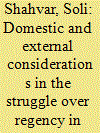

|
|
|
|
|
| Summary/Abstract |
One of the questions which characterized the first two decades after the rise of the Qajars to the Iranian throne was the fierce rivalry between the two leading princes during the reign of Fath-ʿAli Shah, namely, ʿAbbas Mirza Nayib al-Saltanah and Muhammad-ʿAli Mirza Daulatshah. The main cause of this rivalry was the nomination of the former to the position of crown prince and regent instead of the latter, who was the elder of the two. The aim of this article is to explain the reasons for this seemingly unjust decision on the part of Fath-ʿAli, and to discuss the intensity of this princely rivalry, analyzing its repercussions on various domestic and external affairs during the first decades of Qajar rule in Iran.
|
|
|
|
|
|
|
|
|
|
|
|
|
|
|
|
| 4 |
ID:
174905


|
|
|
|
|
| Summary/Abstract |
Nâzım Hikmet is perhaps Turkey’s best-known literary figure from the twentieth century, due at least in part to his dramatic life story and flight from Turkey to the Soviet Union in 1951. During the course of the ten years which followed, Nâzım's common-law wife Münevver Andaç sent him more than 750 letters, only a handful of which have ever been cited in biographical works relating to Nâzım’s life. Drawing upon over 400 letters housed in Moscow’s restricted RGALI archive – to which no Nâzım Hikmet biographer has previously gained access – and another 100 located at the Aziz Nesin Vakfı outside Istanbul, this article constitutes the first time that any of these letters have been analyzed in a systematic manner. The letters, combined with other archival and published materials, are employed in this article as a means of gaining insights into Nâzım’s Soviet years, a notoriously understudied period of his life, as well as Münevver’s life in Istanbul and their shared relationship across the Iron Curtain.
|
|
|
|
|
|
|
|
|
|
|
|
|
|
|
|
| 5 |
ID:
174901
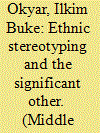

|
|
|
|
|
| Summary/Abstract |
This article examines about a hundred cartoons published during the decade long Kurdish insurgency in the eve of the establishment of the Republic of Turkey from 1925-1938. It attempts to assess how the relational construction between colloquial culture, the cultural construction of national characters and the state discourse are intertwined in defining the self and the other in the development of Turkish national identity. The article seeks to highlight the importance of previously neglected late Ottoman and early Republican colloquial Turkish political cartoons. This approach is crucial to any attempt at capturing the voice of nationalist discourse in the early Republican period, where the perceived image of the Kurd as the significant internal other is tainted forever by its supremacist origins.
|
|
|
|
|
|
|
|
|
|
|
|
|
|
|
|
| 6 |
ID:
174896
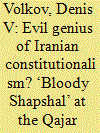

|
|
|
|
|
| Summary/Abstract |
Late Imperial Russia’s multifaceted presence in Persia retains many fascinating life-stories of its actors, who often exerted crucial influence on the course of the history of Russian-Iranian relations of the time. Drawing on international scholarship about the Russian-Iranian relationships at the turn of the twentieth century, but mostly on documents from Russian and Georgian archives and the diaries of his contemporaries as well as his own private notes, this article examines the activities of Seraia Shapshal (1873–1961), focusing on his embeddedness both in the Qajar court and in Late Imperial Russia’s policy towards Iran during the period 1900 to 1908. The paper for the first time in Iranian studies sheds light in sufficient detail upon how Shapshal found himself in Persia and what enabled him to reach the highest levels of power at the Qajar court. In so doing, it also identifies his leading role in the June 1908 anti-constitution coup.
|
|
|
|
|
|
|
|
|
|
|
|
|
|
|
|
| 7 |
ID:
174903
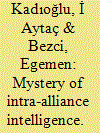

|
|
|
|
|
| Summary/Abstract |
Intra-alliance intelligence is utilised to collect, process and evaluate information about allies. This task played a critical role when the Southern Flank of NATO, Greece and Turkey caused a severe dispute in Cyprus which has been Europe’s longest remaining cold conflict. The Turkish Secret Service’s operations in Cyprus during its origins in the Cold War and the intra-alliance intelligence task have been largely overlooked in the existing literature. The article aims to close this gap through a threefold analysis: support for resistance, operational assistance, and capabilities and war preparedness. The investigation of Turkey’s covert operations in Cyprus between 1953 and 1970 reveals the route of intra-alliance espionage in the Cyprus conflict and helps understanding how states act covertly against their allies. The article uses archival documents in the UK and Turkey that provide extensive declassified secret documents to assess the covert action of Turkish intelligence in the Cyprus conflict.
|
|
|
|
|
|
|
|
|
|
|
|
|
|
|
|
| 8 |
ID:
174894


|
|
|
|
|
| Summary/Abstract |
The history of the Sheikdom of al-Zubayr is an essential aspect of Gulf history as it closely relates to significant events that have helped shape the region. Due to the relative lack of research into this important sheikhdom, this article makes a significant contribution to the historical narrative of al-Zubayr focusing on its links between its sister city states of Najd. This paper notably investigates the political relationship between al-Zubayr and the Najd city states of Harma and Huraymila. In doing so, the article shows how this sheikhdom, has been socially, culturally and politically shaped by the Najdi city states. Hence, the article argues that al-Zubayr also occupies a central position in the political and religious landscape of that time as it acted as a de facto refuge for many powerful Najdi clans during the rise of the Saudi/Wahhabi movement. Based on a review of several Arabic primary sources, it is shown how the Najdi city states’ political conflicts were exported to the sheikhdom of al-Zubayr which witnessed a particularly violent political history shaped by the various conflicts between two main Najdi factions, Harma and Huraymila.
|
|
|
|
|
|
|
|
|
|
|
|
|
|
|
|
| 9 |
ID:
174898


|
|
|
|
|
| Summary/Abstract |
Four decades after the establishment of the Islamic Republic of Iran, a wealth of scholarship exists detailing the failures and achievements of the ruling clergy. Such lines of inquiry explore not only the economic, political and foreign policies of the clerical establishment, but also the performance of the ruling clergy in the religious sphere. However, an important matter that has attracted scant interest is the ruling clergy’s policies regarding the Shi’i traditional orthodoxy, that is, their fons et origo. Reminding readers that governmental-Shi’ism emerged as a marginal discourse within the Shi’i seminary in the 1970s, this paper explains how the ruling clergy waged a calculated campaign aimed at transforming the flexible, pluralistic and independent nature of the traditional orthodoxy into a system dependent upon the state and submissive to its government-centric reading of Shi’ism. We argue that the ruling clergy have succeeded in establishing and making state-sponsored institutions important players in the seminary and Shi’i establishment. However, they have failed to abolish the traditional orthodoxy in which distance and independence from the state have remained foundational features.
|
|
|
|
|
|
|
|
|
|
|
|
|
|
|
|
| 10 |
ID:
174902
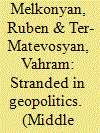

|
|
|
|
|
| Summary/Abstract |
The Republic of Turkey of the 1920s and 1930s was a complex place to live. Kemalism came to nurture and embrace a new citizen who had no other choice but that of being a Turk as stipulated by the 1924 constitution. It was particularly challenging for Christian minorities, or what was left of them, because of ultra-nationalism and the highly ideological nature of the one-party regime of the Kemalist era. Many Armenians, who chose to stay or had to stay in Turkey, were not at ease with the existing state of affairs. Most of them were still looking for ways to leave Turkey for safer places. It became a particular matter of contention in the initial years of the Cold War when the Soviet Union launched a policy of encouraging Turkish Armenians to migrate to Soviet Armenia. Based on Russian, Turkish, and Armenian sources, the article presents hitherto unexplored features of that policy.
|
|
|
|
|
|
|
|
|
|
|
|
|
|
|
|
|
|
|
|
|